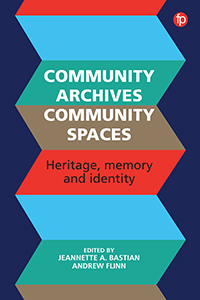
Primary tabs
You don't need to be an ALA Member to purchase from the ALA Store, but you'll be asked to create an online account/profile during checkout to proceed. This Web Account is for both Members and non-Members. Note that your ALA Member discount will be applied at the final step of the checkout process.
If you are Tax-Exempt, please verify that your account is currently set up as exempt before placing your order, as our new fulfillment center will need current documentation. Learn how to verify here.
- Description
- Table of Contents
- About the authors
- Reviews
This book traces the trajectory of the community archives movement, expanding the definition of community archives to include sites such as historical societies, social movement organizations and community centers, and explore new definitions of what community archives might encompass, particularly in relationship to disciplines outside the archives.
Over ten years have passed since the first volume of Community Archives, and inspired by continued research as well as by the formal recognition of community archives in the UK, the community archives movement has become an increasing important area of research, recognition and appreciation by archivists, archival scholars and others worldwide. Increasingly the subject of papers and conferences, community archives are now seen as being in the vanguard of social concerns, markers of community-based activism, a participatory approach exemplifying the ongoing evolution of "professional" archival (and heritage) practice and integral to the ability of people to articulate and assert their identity. Community Archives, Community Spaces reflects the latest research and will also include practical case studies on the challenges of building and sustaining community archives.
This new book will appeal to practitioners, researchers, and academics in the archives and records community as well as to historians and other scholars concerned with community building and social issues.
List of figures
Contributors
Acknowledgments
Introduction - Jeannette A. Bastian and Andrew Flinn
PART 1 ANALYTICAL ESSAYS
1 Archival optimism, or, how to sustain a community archives
Rebecka Taves Sheffield
2 Affective bonds: what community archives can teach mainstream institutions
Michelle Caswell
3 Community archives and the records continuum
Michael Piggott
PART 2 CASE STUDIES
4 Tuku mana taonga, tuku mana tāngata – Archiving for indigenouslanguage and cultural revitalisation: cross sectoral case studies from Aotearoa, New Zealand
Claire Hall and Honiana Love
5 Self-documentation of Thai communities: reflective thoughts on the Western concept of community archives
Kanokporn Nasomtrug Simionica
6 Popular music, community archives and public history online cultural justice and the DIY approach to heritage
Paul Long, Sarah Baker, Zelmarie Cantillon, Jez Collins and Raphaël Nowak
7 Maison d’Haïti’s collaborative archives project: archiving a community of records
Désirée Rochat, Kristen Young, Marjorie Villefranche and Aziz Choudry
8 Indigenous archiving and wellbeing: surviving, thriving, reconciling
Joanne Evans, Shannon Faulkhead, Kirsten Thorpe, Karen Adams, Lauren Booker and Narissa Timbery
9 Community engaged scholarship in archival studies: documenting housing displacement and gentrification in a Latino community
Janet Ceja Alcalá
10 Post-x: community-based archiving in Croatia
Anne J. Gilliland and Tamara Štefanac
Index
Jeannette A. Bastian
Jeannette A. Bastian is Associate Professor and Director of the Archives Program Graduate School of Library and Information Science, Simmons College, Boston.
Andrew Flinn
Andrew Flinn is the Director of the Archives and Records Management MA program in the Department of Information Studies at University College London, where he has been teaching since 2002, and was the chair of the UK and Ireland Forum for Archives and Records Management Education and Research (FARMER) between 2008 and 2011. In the Spring term 2011 he was a visiting professor and the Allan Smith Visiting Scholar in the Graduate School of Library and Information Science at Simmons College Boston. In 2012 and 2013 he was Principal Investigator on the "Dig Where You Stand" a UK Arts and Humanities Research Council (AHRC) funded Research into Community Heritage award which examines a collaborative approach to community heritage activity including archives, archaeology, museums, film studies and digital humanity scholars. Between 2008 and 2010 he led another AHRC funded research project "Community Archives and Identities" which examined the motivations, impacts and challenges of independent and community-led archive and heritage initiatives of African, Asian and other heritage groups in the UK. Prior to his appointment at UCL he was an archivist at the National Museum of Labour History in 1990-1999 and research officer at the University of Manchester on the ESRC funded Communists in British Society Biographical project (1999-2001). He received his PhD from University of Manchester in 1999. His research interests include radical public history, independent archives and community history projects, oral history, heritage activism and social justice, user generated content and participatory approaches to archival practice, DIY culture and the production if knowledge / culture and the impact of access to information legislation on democratic processes. He has also written on different manifestations of grassroots political activism in twentieth century Britain. As a researcher he is interested in further exploring the application of ethnographic, participatory, and community-based approaches to archival research.
"Present[s] diverse approaches to curating heritage, memory, and identity in selected indigenous and marginalized communities ... Though the volume's intended audience includes professional archivists, archival educators (college faculty), and students engaged in the study of archives, public history, and social justice, the book will also inspire community activists, government agencies, and self-motivated curators to engage in community archives."
— CHOICE


